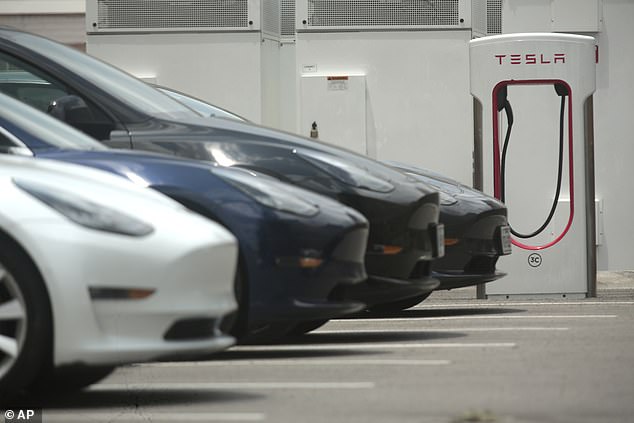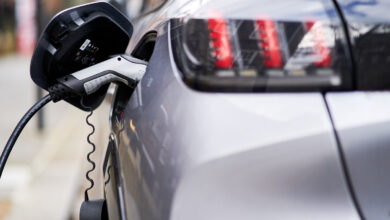Crooks are posing yet ANOTHER threat to EV adoption in America: ‘This worries me the most’

A new threat is posing further obstacles to electric vehicle ownership for Americans.
Thieves are targeting charging stations and stealing the cables. This can mean the loss of $1,000-plus cables – but there is an even bigger knock-on effect.
Crooks cutting wires can disable entire stations – forcing owners to search desperately for another working charger that might be miles away.
So-called ‘range anxiety’, slow charging and a lack of public stations have long put Americans off switching to EVs – despite tax credits from President Biden.
And now broken down chargers are exacerbating the problem – giving skeptical buyers one more reason to stick with gas cars for now.
‘For the myriad reasons people give for EVs not working, cable theft is the one that would worry me the most,’ one user wrote on X, formerly Twitter.
The reason thieves are targeting EV charging cables is because they contain copper wiring.
The price of copper is near a record high on global markets, so criminals stand to collect rising sums of cash from selling the material.
But while it costs $1,000 to replace a charging cable, authorities say, thieves only stand to make $20 reselling the metal.
Thieves have been caught on camera in Seattle targeting an EV charging station on the edge of a shopping center parking lot.
CCTV footage shows them using bolt cutters to snip several charging cables and load them into a truck – all in just a few minutes.
And these incidents are on the rise, according to Electrify America, which runs the nation’s second-largest network of direct-current fast chargers.
While two years ago, a cable might be cut perhaps every six months at one of its 968 charging stations, 129 cables were cut through May this year.
That is four more than the total number in the whole of last year.
At one Seattle station, cables were cut six times in the past year, said Anthony Lambkin, Electrify America’s vice president of operations.
‘We’re enabling people to get to work, to take their kids to school, get to medical appointments,’ Lambkin told AP.
‘So to have an entire station that’s offline is pretty impactful to our customers.’
Two other leading EV charging companies – Flo and EVgo – have also reported a rise in thefts.
Charging stations in the Seattle area have been a frequent target. But sites in Nevada, California, Arizona, Colorado, Illinois, Oregon, Tennessee, Texas and Pennsylvania have also been hit.
Stations run by Tesla, which operates the largest fast-charging network in the US, have also been targeted in Seattle, Oakland and Houston.
Thieves have hit Tesla stations four times this year compared with just once last year, according to the Seattle police.
But the problem is not confined to urban areas.
In rural Sumner, Washington, about 30 miles south of Seattle, thieves cut cables twice at a Puget Sound Energy charging station.
The company is working with police and the property owner to protect the station, which cost more than $500,000 to install.
Stations run by Tesla, which operates the largest fast-charging network in the US, have also been targeted in Seattle, Oakland and Houston

The reason thieves are targeting EV charging cables is because they contain valuable copper wiring
Some EV owners have expressed their frustration online about the rising problem.
‘As long as copper is worth money this is going to be an issue,’ one user wrote on Reddit. ‘Efficient wireless high-powered charging needs to come quick.’
‘I guess if you’re getting into the black market economy, scrap metal is the way,’ another added.
Various people suggested new infrastructure should be put in place which requires people to bring their own cable.
‘This is one of the reasons I prefer the European-style chargers that require you to bring your own cable,’ one user wrote.
In one case in Houston, Texas, thieves swiped 18 or 19 cords at one Tesla station alone.
Sgt. Robert Carson, who leads a police metal-theft unit in the city, visited the station to inspect the damage and said that in the first five minutes he was there, around ten EVs that needed charging had to be turned away.
The charging companies say it has become clear that the thieves are after the copper that the cables contain.
In late May, copper hit a record high of nearly $5.20 a pound, a result, in part, of rising demand resulting from efforts to cut carbon emissions with EVs that use more copper wiring.
The price is up about 25 percent from a year ago, and analysts envision further increases.
Charging companies say there is not actually very much copper in the cables, and what copper is there is difficult to extract.
Carson estimates that criminals can get $15 to $20 per cable at a scrap yard. But the cables cost around $1,000 to replace.
He urges EV owners to watch for suspicious people near chargers and to call the police.
‘If people are driving down the road and you see a gas-powered vehicle, a truck, at a charging station, that probably doesn’t belong there,’ he said.
Because charging stations are often situated in remote corners of parking lots, Carson suggested that many more security cameras are needed.

The Biden administration has set out targets to gradually phase out gas cars
America’s major automakers have made heavy financial bets that buyers will shift away from combustion engines and embrace EVs as the world faces the worsening consequences of climate change – and the Biden administration announces plans to gradually phase out gas cars.
Stellantis envisions 50 percent of its passenger cars being EVs by the end of 2030.
Ford set a target of producing 2 million EVs per year by 2026 – about 45 percent of its global sales – though it has since suspended that goal.
General Motors, the most ambitious of the three, has pledged to sell only EV passenger cars by the end of 2035.
Any such timetables, of course, hinge on whether the companies can convince more would-be EV buyers that a charge will always be available when they travel.
More than two years after President Biden pledged to build 500,000 EV charging stations throughout the US, only seven are now operational across four states.
In particular, those living in low income areas are facing exclusion from the charging network, analysis by Bumper has revealed, with more than 70 percent of America’s public charge ports located in the wealthiest counties.
This disparity is also stark according to state lines, with Louisiana, Mississippi, Kentucky and Alabama having the lowest number of charge ports per capita, according to the study.



